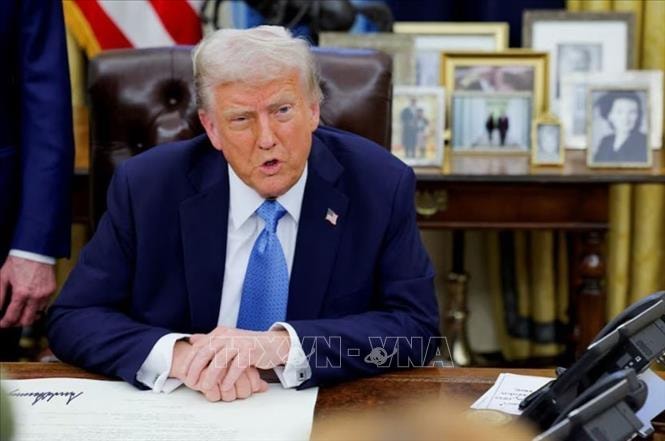President Trump said a series of tariffs on imports from many of America's largest trading partners had been suspended, just 13 hours after the new tariffs were set to take effect.

For weeks, US President Donald Trump has made a series of statements and moves to proceed with plans to impose high tariffs, despite warnings that the policy could cause economic chaos. However, on April 9 (US time), after a global stock market plunge, President Trump changed course.
President Trump said in a social media post that a series of tariffs on imports from many of America’s largest trading partners had been suspended. The announcement came just 13 hours after the new tariffs were set to take effect. Trump cited the turmoil in financial markets following the tariffs as playing a role in his decision, Bloomberg reported.
What tariffs has President Trump suspended?
President Trump announced a 90-day moratorium on reciprocal tariffs—imposed on imports from nearly 60 countries and the European Union. These tariffs are custom-designed for each trading partner based on their trade surplus with the United States. But now, instead of being subject to those custom tariffs, imports from these partners will temporarily be subject to a flat 10% tariff, the rate Trump imposed on all countries starting April 5.
China, one of the countries hit by the new “retaliatory” tariffs, was not included in President Trump’s latest suspension. Instead, Trump announced that he would increase tariffs on Chinese goods from 104% to 125%. Trump’s decision came after Beijing announced plans to retaliate with an 84% tariff on US goods.
In his April 9 post, President Trump also said that other countries subject to his reciprocal tariffs had not retaliated in any way, seemingly emphasizing that only China had responded strongly to the US administration’s tariffs.
Why did President Trump postpone some taxes?
The imposition of reciprocal tariffs has caused turmoil in markets and raised fears of an economic recession. President Trump is said to be under intense pressure from business leaders and investors who have asked him to reverse the tariff policy.
"I think people got a little carried away. They got a little nervous, a little scared," Mr. Trump told reporters at the White House when asked why he changed his mind.
What happens after the moratorium period ends?
The unpredictability of the Trump administration makes this question seem without a definitive answer.
President Trump’s tweet about the delay suggests the move is intended to give U.S. trading partners a chance to negotiate a way out of the tariffs. Trump and other U.S. officials have said they want countries to take steps such as lowering import tariffs and removing other trade barriers, including regulations, quotas, subsidies for domestic producers and intellectual property protections. Trump has argued that the U.S. trade deficit is a result of such barriers and wants to eliminate them.
It’s possible that when the 90-day reprieve ends in early July, countries that haven’t reached an agreement with the US will once again face reciprocal tariffs — tariffs that were not imposed before April 9. But Mr Trump could also delay them again — just as he has twice delayed tariffs on some imports from Mexico and Canada.
Stock market reaction to announcement of temporary suspension of reciprocal tariffs
Stocks surged after President Trump announced a delay in some tariffs, with the S&P 500 up 9.5%, its biggest one-day gain since 2008. The latest move capped a tumultuous week that began when President Trump surprised the world with his shock announcement of the highest tariffs in more than a century.
Oil prices, which had fallen in previous days due to concerns about a global recession, also rebounded thanks to important news from President Trump.
Is America headed for a recession?
Even before President Trump announced the postponement of the new tariffs, the situation had already begun to show signs of a negative trend for the US economy. The decision to impose tariffs, announced by Trump on April 2, has further dampened consumer sentiment. Wall Street banks have also raised the possibility of a global recession this year. Analysts say the prospect of higher prices and more cautious businesses could slow US economic growth and even push the economy into recession.
The stock market surge following Trump’s announcement has provided some relief to Wall Street, and prompted economists at Goldman Sachs to back off their forecast of a recession. But uncertainty over Trump’s next move — along with the impact of tariffs still in place, including steep tariffs on Chinese imports — has left many business leaders and investors worried. The U.S. economy could come under pressure if the concerns lead to large-scale spending cuts.